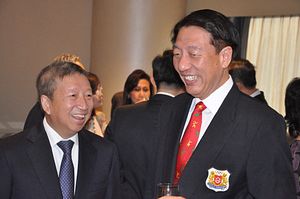Last Wednesday, the Vietnam-Singapore Industrial Park (VSIP), Singapore’s flagship joint venture with Vietnam, celebrated its 20th anniversary. The VSIP has now become a symbol of Singapore-Vietnam economic partnership, as evidenced by the fact that Singapore’s Deputy Prime Minister Teo Chee Hean celebrated this historic milestone during his four-day state visit to Vietnam last week from September 11-14.
The VSIP was first mooted in 1994 by then-prime ministers Goh Chok Tong and Vo Van Kiet. By 1996, this concept had metamorphosed into a 1000-hectare park in Binh Duong. Today, there are seven such industrial parks peppered across the length of the country, attracting more than $9 billion in investments and providing employment to over 170,000 people. Plans to expand the Park are also in the works. An additional 1,500 hectares of land from Binh Duong, near Ho Chi Minh, and Bac Ninh, near Hanoi could potentially be added to the existing 6,600 hectares.
Replete with prepared land plots, ready-built factories and Singapore-style management expertise, the park offers modern infrastructure solutions to foreign and domestic companies keen to tap on Vietnam’s growing labor force and resource advantage. Today, Binh Duong, home to the maiden industrial parks, is one of Vietnam’s top performing provinces, attracting $1.4 billion in FDI over the first 8 months of 2015. Industries and services dominate its economy, accounting for close to 97 percent of total economic activity, a far cry from its primarily agrarian past. Eleven percent of the park’s companies are from Singapore.
Besides physical infrastructure, VSIP’s main selling point is that it creates a pro-business environment through streamlined and efficient services. In VSIP Binh Duong for example, an exclusive government-appointed Investment Management Board was established to expedite business licenses. Many of the VSIPs are also located in Special Economic Zones (SEZs) that offer incentives to foreign investors. On-the-spot logistics and customs service facilities help companies in import and export operations save time and reduce overhead. These services could amount to significant cost reductions in a country plagued with bureaucracy, corruption and inadequate infrastructure.
Though details are scant about what these new expansions will entail, if Singapore’s experience with industrial parks in China is anything to go by, these expanded parks should incorporate “Singapore-style urban solutions” and principles of sustainable growth and living to cater to Vietnam’s urbanization needs.
The establishment of joint-venture industrial parks is part of Singapore’s strategy to build up the city-state’s external economy by exporting ‘Singapore-styled’ business environments. By lending its competitive strengths to these regional sites, Singapore aims to create business opportunities for local and Singapore-based MNCs.
At the recently concluded Singapore-Vietnam Business Forum, Singapore’s Minister for Industry S Iswaran urged Singapore companies to look for “new opportunities” in one of the “most attractive emerging economies in Asia.”
Indeed, Vietnam has become a hotbed for Singaporean investment. Singapore is Vietnam’s third largest investor, coming in behind Japan and South Korea. It is also Vietnam’s sixth largest trading partner. Most recently, Singapore sovereign-wealth fund GIC announced its plans to acquire a 7.73 percent stake, worth approximately $400 million, in Vietcombank, Vietnam’s largest bank, signaling Singapore’s heightened interest in Vietnam. As Vietnam’s economy matures and its consumer market grows, providing food and lifestyle services and urban solutions are potential fields Singapore companies have been encouraged to venture into.
The expansion of VSIP is an important milestone in Singapore-Vietnam economic relations and heralds the beginning of deeper political and economic cooperation. In lieu of the Singapore-Vietnam Strategic Partnership, both countries have pledged to boost cooperation in non-economic areas such as between armies, counter-terrorism efforts, piracy, human trafficking and laundering. As China’s growth slows, Singapore appears to have begun its subtle pivot towards Vietnam.

































